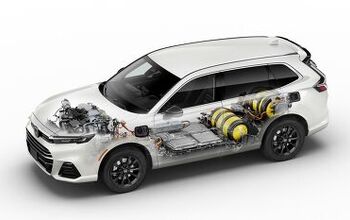Stacking Vehicles to "Reinvent Urban Mobility." Or Not.
The Register reports that MIT scientists have unveiled a new, "stacking vehicle" concept which will "reinvent urban mobility." The concept is based on stacks of small vehicles which fold up to stack together into small racks which would be located near subway stations or bus stops. The vehicles would be powered by "wheel robots:" tiny, self-contained, digitally controlled reconfigurable electric motors in each wheel. In theory, the system provides all-wheel power and steering, easy navigation of urban areas and best of all, sideways parking. The vehicles would charge while folded on their racks; the user would "simply take the first fully charged vehicle from the front of the stack." The concept's website states that "The City car is NOT a replacement for personal vehicles, taxis, buses, or trucks; it is a NEW vehicle type that promotes a socially responsible and more effective means of urban mobility." That doesn't conform to automotive safety standards. Never mind. Team leader architecture professor Bill Mitchell say he'd like to see the system in production in three to four years. Team member Christopher Borroni-Bird is a little more skeptical. "What we have is a very intriguing concept. It is certainly a very promising idea," GM's Director of the Advanced Technology Vehicle Concepts said. "but I don't want to say it is ready for production… there's still a lot of work yet to take it from concept to production." This from the people who champion E85, the Volt and two-mode hybrids.
More by Edward Niedermeyer


































Comments
Join the conversation
Let's look at whether the concept of automated, short-term rental works in other contexts. In Paris, France you can rent a bicycle from thousands that can be found waiting for you in the streets. You register by mobile phone, and call an automated hotline when you want to use a bike. Unlocking and locking works by remote control, and damage to the bikes is within calculable limits. I haven't tried the Paris system but a similar, somewhat less sophisticated bike-rental operation has been running in my home town for about four years, and I love it. We also have automated car-sharing which works pretty good, all things considered. For the above cases, well-planned IT is the foundation. The main problem with driving in large cities is parking, but also that most cars are too darn big and too safe for the required speeds. I think the MIT approach has excellent potential to supplement mass transit. Let's not be luddites.
So what happens to the system when the next little pod in line smells like someone used it as a public bathroom? If they have a little robot that cleans them, ok. Otherwise, back to the lab, Doc.
Why not license more pedicabs?
Wasn't the Segway suppose to do this? I certainly remember the "reinvent urban mobility" hype.